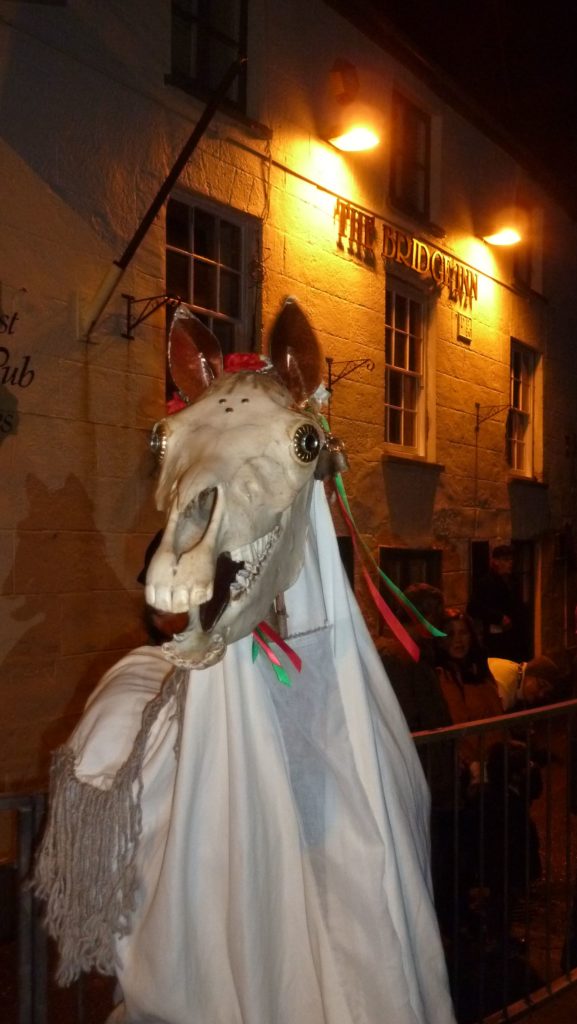
[Photo courtesy of Andy Dingley – Own work, CC BY-SA 3.0, https://commons.wikimedia.org/w/index.php?curid=30730300]
The Mari Lwyd celebrations have long been associated with the Wassailing customs popular throughout the South West and Herefordshire, a celebration of the apple harvest. Both these customs are old, so let’s take a look at their origins.
The ‘Mari’ is a form of guising or mumming: the custom of groups of men travelling from house to house and collecting money. They would sing, and enter into a ‘call and response’ with the householder, who was traditionally supposed to deny them entry, finding a variety of excuses to keep them out (a process known as a ‘pwnco’).
It might begin:
Wel dyma ni’n dwad (Well here we come)
Gy-feillion di-niwad (Innocent friends)
I ofyn am gennad (To ask leave)
I ofyn am gennad (To ask leave)
I ofyn am gennad i ganu (To ask leave to sing)
The householder was also, however, expected to relent eventually – or run out of excuses! – and let the Mari and her followers in, and give them food and drink. Once in the house, the Mari runs about, snapping her jaws and frightening the kids, whilst the rest of the team play music and sing.
The custom was first recorded in 1800, in J Evans’ work ‘A Tour Through Part of North Wales’, but is generally considered to be older, and the etymology of the name is open to some debate: folklorist E Cawte suggested that it refers to the Welsh for ‘Grey Mare,’ but other origins have been proposed, too. Earlier folklorists posited it as a pre-Christian rite, but there is a lack of evidence for this, as with many rural folk customs.
[Media courtesy of Andy Dingley [CC BY-SA 3.0 (https://creativecommons.org/licenses/by-sa/3.0)], from Wikimedia Commons]
The Mari Lwyd is mainly a south Welsh custom, and there’s no apparent correlation between Welsh language speaking areas and the practice (south Pembrokeshire has long been primarily English speaking, for instance). However, it does seem to have been more popular in mining districts. And it’s not just equine: some of the mummers dressed as bulls, and this custom, too, has been revived at Chepstow. Not all the Maris were made from an actual horse’s skull: in the Pembrokeshire village of Solva, in the mid 19th century, the Mari’s head was made out of a sheet stuffed with hay, with button eyes.

[Photo courtesy of Andy Dingley – Own work, CC BY-SA 3.0, https://commons.wikimedia.org/w/index.php?curid=30730191]
So what does Wassailing involve? The word, as most pagans will be aware, comes from the Saxon: Wæs þu hæl, meaning “be thou hale (healthy)”. There are two kinds of Wassailing: house-wassailing and orchard-wassailing. The latter is not a universal British custom, being found predominantly in those areas where apple and pear orchards are a major agricultural feature: primarily, therefore, the South West of the UK. Originally, as the name indicates, it is supposed to have been a Saxon custom, to thank the spirits of the trees for their bounty, but it’s now regarded as a midwinter family evening out and a number of farms arrange Wassailing events in mid January, usually around Old Twelfth Night on the 17th. Mulled cider and wine are given out, sometimes in a ‘loving cup’ (which has two handles, so that two people can drink from it at the same time). A Wassail king and queen are elected, usually by means of a bean found in a piece of cake. A shotgun is fired into the trees and pans are banged, to frighten away evil spirits, and an offering of toast and cider is made, to propitiate the good spirits of the orchards. Then Wassail carols might be sung:
Here’s to thee, old apple tree,
That blooms well, bears well.
Hats full, caps full,
Three bushel bags full,
An’ all under one tree.
Hurrah! Hurrah!
Carhampton, Dunster and Glastonbury all hold regular Wassail events in Somerset, and so do Whimple and Sandford in Devon. Clevedon, near Bristol, hosts one and this is combined with dancing from the local Morris side, who also feature a grumpy pantomime horse.
Some communities still have their original 19th century Wassail cups. One of the folk stories of Somerset tells of the Apple Tree Man: the spirit of the oldest tree in the orchard, who is given the orchard owner’s last glass of mulled cider and in thanks, shows him the way to buried treasure.
House-wassailing has mainly been replaced by carol singing, but there is a revival in the form of the Mari Lwyd. There was a darker side to house-Wassailing, involving groups of rowdy young men who might, if refused entry or food, not only curse the householder but vandalise the property, as well. In a more law-abiding society, this aspect of the practice is thankfully no more.
At Chepstow, this year, the Mari celebrations, described as the ‘newest old tradition in Wales, or perhaps the oldest new tradition,’ will be hosted by the Greenman Backpackers, and you can find their web page here.
The Wild Hunt is not responsible for links to external content.
To join a conversation on this post:
Visit our The Wild Hunt subreddit! Point your favorite browser to https://www.reddit.com/r/The_Wild_Hunt_News/, then click “JOIN”. Make sure to click the bell, too, to be notified of new articles posted to our subreddit.
